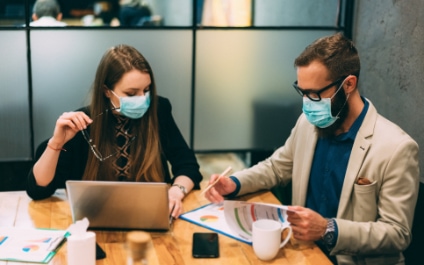As Coronavirus continues to spread around the globe, it is important to be aware of scams associated with it to keep yourself and your business protected. Here are some of the most common Coronavirus scams currently circulating:
Public Health
Scammers are claiming to be the Centers for Disease Control and Prevention (CDC) or the World Health Organization (WHO) and sending messages to individuals and businesses. Some emails may ask for Social Insurance Numbers or tax IDs to steal confidential data, while other versions ask users to click on a link or download a file to install malware. Warn your staff about these emails, and remind them not to respond, click any links, or download any files.
Government Payments
Some scammers are looking to capitalize on government financial assistance programs currently available due to Coronavirus. As a general rule, the government will not email or call you out of the blue – and they will not ask for you to provide personal information or submit an up-front payment.
Phishing Emails
Due to the pandemic, there are many unusual procedures in place – including irregular financial transactions like expedited orders, cancelled orders, and unexpected refunds. As a result, emergency requests that would have previously caused suspicion seem more commonplace, which is a perfect weakness for hackers and scammers to take advantage of. Common scams include emails from executives asking for a money transfer or requesting gift card codes, or emails from I.T. personnel including download links for new software or requesting a password.
We recommend warning your staff of these types of scams and providing an in-house contact they can reach out to in order to verify requests they may receive.
Supply Scams
Scammers are taking advantage of the scramble for supplies by creating websites that look similar to well-known businesses. They claim to have the supplies you need but are actually just pulling your credit card information when you pay for your “order.” To make sure you are ordering from a reputable supplier, we recommend typing in the web address directly instead of clicking on a link or an ad, as these can easily be created by scammers to trick you into visiting their fraudulent website. Robocalls are also circulating, targeting small businesses and trying to sell sanitation supplies or testing kits.
Unauthorized Charities and Non-Profit Organizations
Be aware of unauthorized or fraudulent charities asking for donations for victims, research, or products. Don’t feel pressured to donate on the spot and verify that the charity is registered before transferring any money.
Cures and Vaccines
There are no cures and no vaccines currently available for Coronavirus. If you receive an email or phone call offering you access to one of these, it is a scam.
Opportunities for Investment
Some scammers are posing as loan and financial service companies to offer loans, financial aid, debt consolidation, and investment opportunities as a way to get your Social Insurance Number or have you transfer them money. Remember, reputable financial institutions do not reach out to you without you initiating contact.
Looking for more advice or information? We would be happy to answer your questions.


